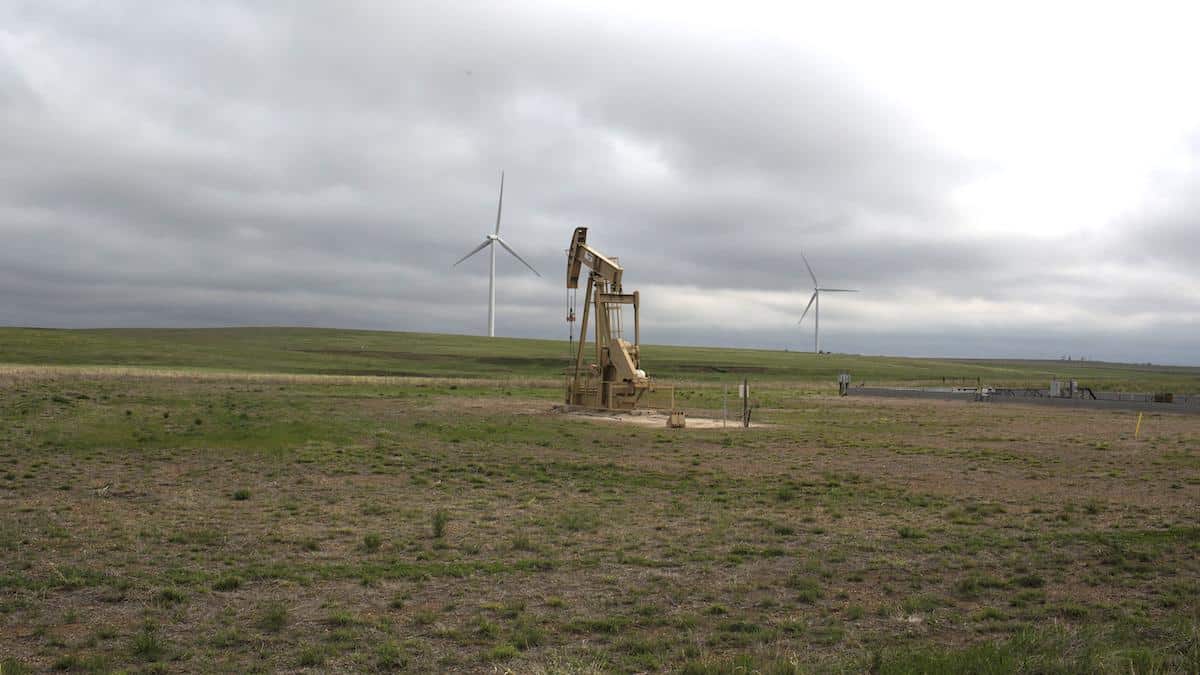
Utility Company in Oklahoma May Charge $1,400 Fee to Switch From Gas to Electric

A natural gas pump sits on land next to windmills in rural western Oklahoma, where fracking and wind power are both common sights along the roads, on May 10, 2021. Andrew Lichtenstein / Corbis via Getty Images
A utility company in Oklahoma could start collecting a $1,400 “exit fee” for customers who switch from gas service to electric. If approved, the new fees could set a precedent for fossil fuel companies and discourage customers from switching to electric heating and stoves.
Oklahoma proposed the new exit fees as part of a larger plan for Oklahoma Natural Gas, the state’s largest utility company, to sell off its debt. The debt comes from a historic cold snap in February 2021, which caused fuel costs to sharply increase.
The exit fee solely targets clients switching to electric and could be approved by December. If so, the fees would go into effect in June 2022. The proposal is currently under review by a judge at the Oklahoma Corporation Commission.
Environmentalists warn that this move would prevent customers from transitioning to zero-carbon energy sources, as the cost to switch would increase exponentially. The precedent is already set, though, as officials in Texas and Kansas are now considering similar proposals.
“Exit fees are just one more example of barriers being put in place to make it more difficult for customers to electrify their homes and cut greenhouse gases,” Charlie Spatz, a researcher who tracks preemption laws at the Energy and Policy Institute, told HuffPost. “As gas prices rise and consumers are more concerned about their carbon footprints, this exit fee could become a serious financial hurdle locking customers into the gas system.”
The move to enact exit fees comes after Oklahoma banned new gas hookups in buildings, following a similar decision in Berkeley, California that requires new buildings to have electricity rather than gas. Meanwhile, over 20 states under conservative leadership have made laws to ban such bans on gas. The exit fees are another strategy to keep fossil fuels in power, despite the fact that buildings (including operations and construction) are responsible for nearly 40% of carbon emissions in the U.S.
Oklahoma Natural Gas advocated for the state preemption law and didn’t request the potential exit fees. But its debts required it to borrow $1.5 billion from Bank of America. Lawmakers that support Oklahoma Natural Gas have instead created ways for the utility company to pay off this debt, first through securitizing. More recently, an Oklahoma Corporation Commission staff member suggested the exit fee as an ongoing way to collect money to pay toward the debts. Oklahoma Natural Gas and its parent company, ONE Gas, don’t oppose the idea.
“This fee is intended only as a funds recovery mechanism and not as a hindrance for customers who would seek to leave the natural gas system,” said Lizaimee Steger, a spokesperson for ONE Gas. “The fee is one small part of the securitization process designed to minimize impact to all our customers.”
The exit fee is part of a larger proposal, but Oklahoma Natural Gas did not include this idea in its initial application. That has left environmentalists reeling. They note that there was no time to protest the fees.
“This shameful proposal would penalize customers trying to move away from the risky, costly, dirty fuel of fracked gas that caused energy prices to skyrocket and led to this securitization docket in the first place,” Cheyenne Skye Branscum, chair of the Sierra Club’s Oklahoma chapter, said in a statement. “Trapping ONG customers in a financial vice runs counter to the freedom narrative we regularly hear from fossil fuel utilities and corporations.”

 233k
233k  41k
41k  Subscribe
Subscribe 